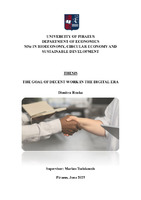The goal of decent work in the digital era

Master Thesis
Author
Rouka, Dimitra
Ρούκα, Δήμητρα
Date
2025-06View/
Keywords
Sustainable Development Goal 8 (SDG 8) ; Decent work ; Agenda 2030 ; European and global indicators ; Employment and sustainability ; Vulnerable social groups ; Digital economy ; Automation ; Artificial intelligence ; Gig economy ; Algorithmic management ; Job displacement ; Social responsibility ; Labor challenges ; Digital skills ; Digital inequality ; Inclusive employment practices ; Diversity and inclusion ; Institutional role in employment ; Future of work ; AIAbstract
The digital era is fundamentally reshaping the world of work, raising critical questions about job security, employment rights, and inclusivity. This thesis examines these transformations through the framework of Sustainable Development Goal 8 (SDG 8), which promotes decent work and economic growth. As automation, artificial intelligence, and the gig economy redefine traditional employment structures, a key concern emerges: Are we losing our jobs? The study explores both the risks of job displacement and the new opportunities that digitalization creates, emphasizing the need for policies that ensure fair working conditions in the evolving labor market.
The research also investigates the role of social groups in the workplace, the impact of algorithmic management, and the widening digital skills gap. In response to these challenges, it highlights the importance of digital inclusion, vocational training, and corporate social responsibility in fostering an equitable workforce. Furthermore, it assesses the effectiveness of existing policy and regulatory frameworks, questioning whether they can adequately protect workers' rights in the face of rapid technological change.
Beyond these challenges, the thesis explores the environmental dimension of digitalization, including its potential to support sustainability, and it also analyzes case studies of companies that have successfully implemented best practices for decent work and inclusivity, serving as models for others to follow. Ultimately, this research underscores the urgency of proactive policy-making and corporate strategies that prioritize both human well-being and economic progress in the digital era.
Since change is inevitable, it is our collective responsibility to shape it into a force for positive impact and sustainable development.


